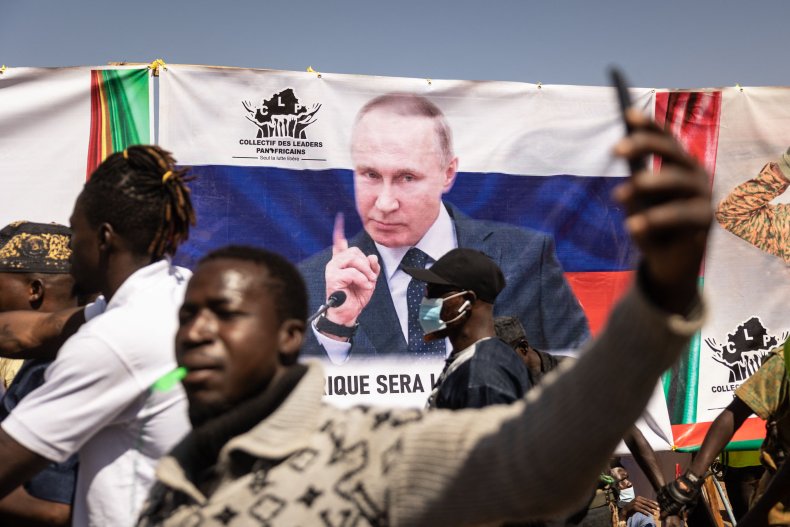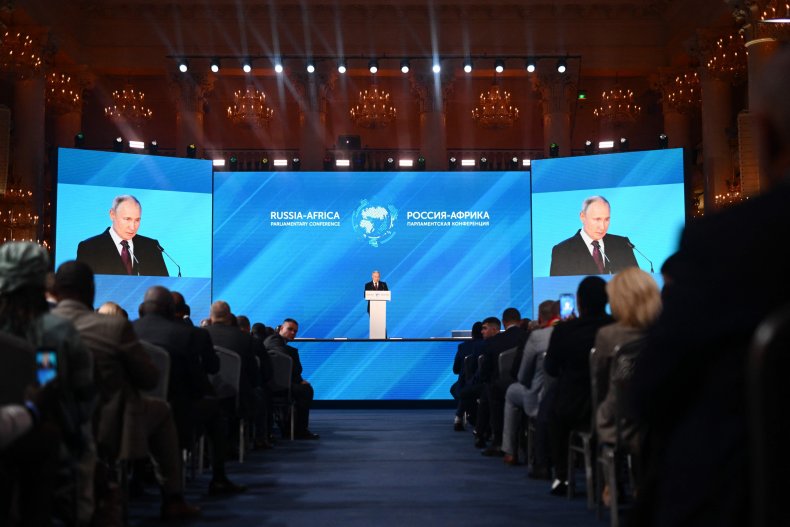Russia's ambassador to the United States has told Newsweek that Moscow is preparing to boost strategic ties with African nations in line with an emerging new international order as President Vladimir Putin prepares to host most of the continent's leaders for a summit later this week.
The gathering will come amid Western accusations that Russia is weaponizing food exports after Moscow pulled out of a grain deal and struck Ukrainian ports in a war that just entered its 18th month.
"Russia has rich and long-standing relations with African countries," Ambassador Anatoly Antonov told Newsweek. "Nowadays we intend to give an additional impetus to these ties and elevate them to a brand-new level."
This concept, he argued, "stands behind the Second Russia-Africa Summit, which will take place on July 27-28 in Saint Petersburg," the second of its kind since the debut event was held October 2019 in Sochi. Since then, Russia has maintained robust relations across much of Africa, even as a largely Western coalition of nations backing Kyiv seek to isolate Moscow on the world stage.
The upcoming summit will serve as an opportunity to showcase Russia's staying power in this part of the Global South amid a shift in a broader shift in global geopolitics.
"We look forward to developing the mutually beneficial strategic partnership with the countries of the continent at a time when a multipolar world order is taking shape," Antonov said.

While located far from the frontlines of the conflict raging in Ukraine, many African nations have been impacted directly by the war. Russia and Ukraine together account for nearly a third of global exports of critical grains such as wheat and barley, deliveries of which have been disrupted due to active fighting in Ukraine and Western sanctions against Russia.
A deal forged a year ago under the auspices of Türkiye and the United Nations, through which a rare mutual buy-in from Moscow and Kyiv was secured, allowed for the continued to export of grains from Ukrainian ports. However, Russia terminated the agreement last week, arguing that the arrangement did not sufficiently allow for Russia to export its own food and fertilizer as a result of ongoing sanctions.
In a statement published to the Kremlin's website and shared with Newsweek by the Russian Embassy to the United States on Sunday, Putin recited this reasoning and argued that the initiative ended up being "shamelessly used solely for the enrichment of large US and European businesses that exported and resold grain from Ukraine" rather than serving its initial humanitarian purpose.
The Russian leader also offered to replace the Ukrainian supply with Russia's own exports as food security is set to be a major topic in Saint Petersburg.
"I want to give assurances that our country is capable of replacing the Ukrainian grain both on a commercial and free-of-charge basis, especially as we expect another record harvest this year," Putin said. "Notwithstanding the sanctions, Russia will continue its energetic efforts to provide supplies of grain, food products, fertilizers and other goods to Africa."
Putin also took the opportunity to highlight growing ties with African countries, naming a number of initiatives in trade, education and other fields, while noting that "the potential of our trade and economic partnership is much higher." He noted potential cooperation "in the sphere of high technologies and geological exploration, in the fuel and energy complex, including nuclear power, in the chemical industry, mining and transport engineering, agriculture and fishery."
He touted his administration's efforts "to prepare an impressive package of intergovernmental and inter‑agency agreements and memoranda with individual states as well as regional associations of the continent" during the upcoming summit.
And he too referenced the rise of "a new multipolar world order," which he said "will be more just and democratic." He asserted that "there is no doubt that Africa, along with Asia, the Middle East and Latin America, will take its worthy place in it and finally free itself from the bitter legacy of colonialism and neo-colonialism, rejecting its modern practices."
Newsweek has reached out to the Ukrainian Foreign Ministry for comment.
African countries have also stepped up their diplomacy around the ongoing conflict. As previewed by Newsweek, a delegation of six African heads of state hailing from Egypt, the Republic of the Congo, Senegal, South Africa, Uganda and Zambia traveled to both Moscow and Kyiv last month in a bid to advance Russia-Ukraine peace talks.
Weeks earlier, Russian Foreign Minister Sergey Lavrov also appeared in South Africa alongside the African nation's foreign minister and top diplomats from Brazil, China and India for a BRICS ministerial. Russian Security Council Secretary Nikolai Patrushev also traveled to South Africa to attend the economic quintet's security meeting on Monday, when he accused the West of using "any means—from unilateral sanctions to waging hybrid wars—in an attempt to preserve its hegemonic global position."
But it would be Lavrov again who represented Russia in person at next month's BRICS leader's summit, with Putin instead appearing via video link amid a controversy over whether South Africa would be legally obliged to arrest Putin in line with an International Criminal Court (ICC) warrant issued in March over war crime allegations related to the war in Ukraine.
South Africa and Ukraine are parties to the ICC's founding Rome Statue, while neither Russia nor the U.S. is. Washington has nonetheless welcomed the ICC decision and has increasingly criticized Moscow's inroads to Africa, including in security affairs.
Russia's security cooperation in Africa has been highlighted not only by official bilateral agreements but also the presence of the Wagner Group, led by Yevgeny Prigozhin. While the private military company's future remains uncertain following Prigozhin's abortive uprising last month, U.S. officials have accused Russia and the Wagner Group of influencing Mali's decision to withdraw consent for United Nations Peacekeepers just weeks later.
Mali is one of several nations in which growing support for Russia has manifested amid heightened frustration over the presence of Western powers, especially France, which has increasingly withdrawn its troops from the continent.

Reached for comment, a U.S. State Department spokesperson told Newsweek that "African officials attending the summit should call on Russia to prevent further Wagner abuses against Africans, return to the Black Sea Grain Initiative (BSGI), and end the war it unilaterally started."
"Summit attendees already know very well the direct negative effects of Moscow's cruel war against Ukraine and Russia's departure from the BSGI like higher prices and less food for vulnerable populations in Africa," the State Department spokesperson said. "They should be skeptical of any promises Moscow makes, especially given its failure to follow through on so many from the last summit in 2019."
On the item of potential diplomacy, the State Department spokesperson reaffirmed the stated position of President Joe Biden's administration that mandated discussing "nothing about Ukraine without Ukraine." As such, when it comes to diplomatic initiatives, the State Department spokesperson said that "we encourage countries, including African countries, to engage directly with Ukraine, up to and including visits to Ukraine, to hear Ukraine's perspective—and witness the effects of Russia's war."
The State Department spokesperson also argued that "Russia's predatory actions go beyond its invasion of Ukraine, a clear violation of the UN Charter, to its malign influence operations targeted at African countries," echoing accusations of alleged human rights violations by the Wagner Group.
"Russia's withdrawal from the BSGI and strikes on the Odesa port, grain warehouses along the Danube, and Ukraine's farmland in the east show it is not interested in getting grain to countries that need it most," the State Department spokesperson said. "The best thing Russia could do for Africa's food security is to end these attacks and return to and fully implement the Black Sea Grain Initiative (BSGI), which helped address a problem Russia, and Russia alone, created."
"Instead, Russia first obstructed and has now unilaterally withdrawn from the BSGI," the State Department spokesperson added. "As blatantly demonstrated last year, this will further exacerbate food price inflation and insecurity in African countries and around the world."
It's not the first time that Moscow and Washington have traded jabs over Africa.
When Russian ambassador-at-large and head of the Russia-Africa Partnership Forum Oleg Ozerov told Newsweek in May of "unprecedented momentum" in shoring up Russia-Africa relations, a State Department spokesperson asserted that U.S. officials "are confident that our partners will see through Russia's cynical attempts at disinformation and focus on the lives lost and the misery Russia's needless war has inflicted both on the people of Ukraine and also on vulnerable people far beyond Ukraine due to the war's exacerbation of food insecurity."
But, like Ozerov and Antonov, Putin expressed his own confidence that Moscow's message would resound at the upcoming gathering in Saint Petersburg.
"I am looking forward to welcoming the African leaders in St. Petersburg and stand committed to a fruitful constructive dialogue," Putin said in his statement Sunday. "I firmly believe that the decisions adopted at the Summit and Forum, coupled with continuous diversified joint work will contribute to further development of Russian‑African strategic partnership for the benefit of our countries and peoples."
This article has been updated to include comments made by a U.S. State Department spokesperson received after publication.








